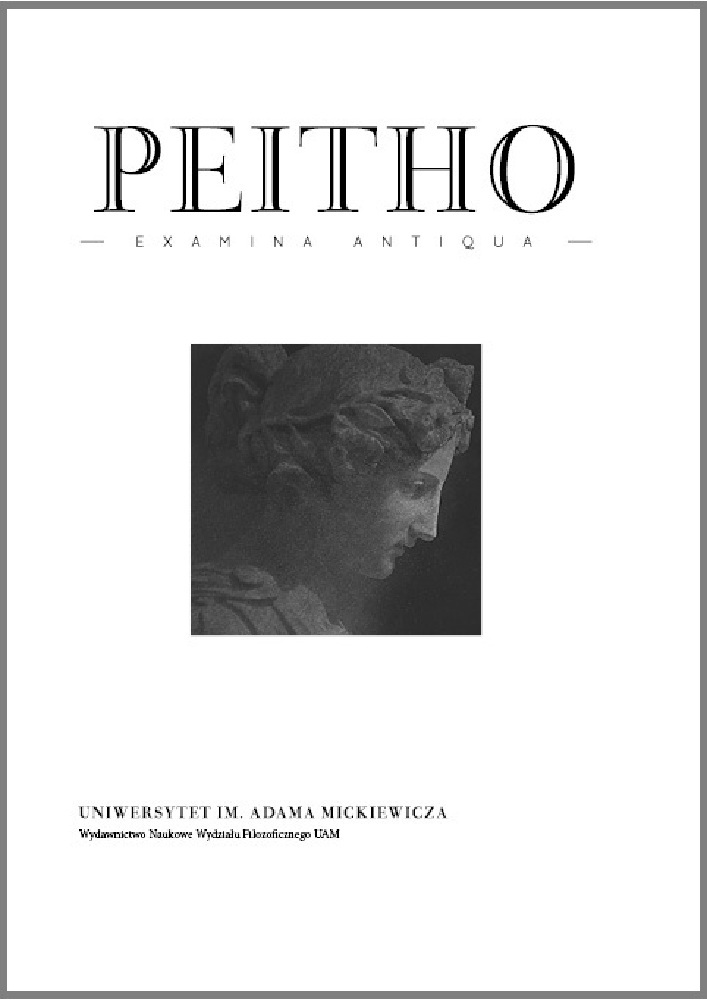Abstract
Argument and literary form, and how they both relate to each other, are crucial aspects of any interpretation of the Platonic dialogues. Plato the author and Plato the philosopher always work hand in hand in that Plato the author tries to serve Plato the philosopher. It is, therefore, an appropriate principle for approaching the study of Plato’s philosophy to take into account the literary aspects of the dialogues and to ask how Plato’s literary art of writing could possibly support his philosophical message and, for instance, to consider what this relation means in the context of the debate about developementalism versus unitarianism in Plato’s philosophy. In the present paper , I argue that the performance of the characters plays an important role in this context. I discuss various passages in the Laws which analyse the weakness of the will and I compare what Plato says there with the performance of Alcibiades in the Symposium. I conclude that the passages in the Laws can be read as a kind of commentary on Alcibiades’ behavior and I consider what this relation means in the context of the debate about developementalism versus unitarianism in Plato’s philosophy.
References
Bobonich, C. (hrsg.), 2007, Akrasia in Greek Philosophy: From Socrates to Plotinus, Leiden 2007.
Bobonich, C., 2002, Plato’s Utopia Recast: His Later Ethics and Politics, Oxford.
Carone, G. R., 2001, “Akrasia in the Republic: Does Plato Change His Mind?”, Oxford Studies in Ancient Philosophy 20, S. 107–148.
Dodds, E., 1959, Plato, Gorgias, Oxford.
Erler, M., 2004, “Socrates in the Cave. Argumentations as Therapy for Passions in Gorgias and Phaedo”, in: M. Migliori (hrsg.), Plato Ethicus. Philosophy is Life. Proceedings of the International Colloquium Piacenza 2003, St. Augustin, S. 107–120.
Erler, M., 2007, “Platon”, in: H. Flashar (hrsg.), Grundriss der Geschichte der Philosophie. Begründet von Friedrich Ueberweg. Völlig neu bearbeitete Ausgabe. Die Philosophie der Antike, Bd. 2.2, Basel.
Erler, M., 2008, “Platon: Affekte und Wege zur Eudaimonie“, in: H. Landweer, U. Renz (hrsg.), Klassische Emotionstheorien der Philosophiegeschichte, Berlin–New York, S. 19–44.
Erler, M., 2009, “The Fox Knoweth Many Things, the Hedgehog One Great Thing: The Relation of Philosophical Concepts and Historical Contexts in Plato’s Dialogues”, Hermathena 187, S. 5–26.
Erler, M., 2010, “Charis und Charisma. Zwei Bilder vom Weisen und ihre Diskussion in Platons Dialogen“, in: D. Koch, I. Männlein-Robert, N. Weidtmann (hrsg.), Platon und das Göttliche, Tübingen, S. 42–61.
Erler, M., 2015, “Argument and Context: Adaption and Recasting of Positions in Plato’s Dialogues”, in. D. Nails, H. Tarrant (hrsg.), Second Sailing: Alternative Perspectives on Plato, Helsinki 2015, S. 91–105.
Erler, M., 2016, “Diogenes against Plato. Diogenes’ Critique and the Tradition of Epicurean Antiplatonism”, in: J. Hammerstaedt, P.-M. Morel, R. Güremen (hrsg.), Diogenes of Oenoanda. Epicureanism and Philosophical Debates, Leuven, S. 51–65.
Frede, D., 2010, “Puppets on Strings: Moral Psychology in Laws Books 1 and 2”, in: C. Bobonich (hrsg.), Plato’s Laws. A Critical Guide, Cambridge, S. 108–126.
Fuhrer, T., Renger A.-B. (hrsg.), 2012, Performanz von Wissen, Heidelberg.
Gerson, P., 2003, Knowing Persons. A Study in Plato, Oxford.
Görgemanns, H., 1960, Beiträge zur Interpretation von Platons „Nomoi“, München.
Horn, C. (hrsg.), 2013, Gesetze – Nomoi, Berlin 2013.
Horn, C., 2013a, “Politische Philosophie in Platons Nomoi. Das Problem von Kontinuität und Diskontinuität“, in: C. Horn, Gesetze – Nomoi, Berlin, S. 1–22.
Kobusch, T., 1996, “Wie man leben soll: Gorgias“, in: T. Kobusch, B. Mojsisch (hrsg.), Platon. Seine Dialoge in der Sicht neuer Forschungen, Darmstadt, S. 47–63.
Laks, A., 2001, “In What Sense is the City of the Laws a Second Best One?”, in: F. Lisi (hrsg.), Plato’s Laws and its Historical Significance, St. Augustin, 107–114.
Manuwald, B. (Übers. & Komm.), 1999, Platon. Protagoras, Göttingen.
Müller, J., 2013, “Der Mensch als Marionette: Psychologie und Handlungstheorie”, in: C. Horn (hrsg.), Gesetze – Nomoi, Berlin, S. 45–66.
Reeve C. D. C., 2006, “A Study in Violets: Alcibiades in the Symposium”, in: J. H. Lesher, D. Nails, F. C. C. Sheffield (hrsg.), Plato’s Symposium, Washington, S. 124–146.
Rowe, C., 2007, “The Moral Psychology of the Gorgias”, in: M. Erler, L. Brisson (hrsg.), Gorgias – Menon. Proceedings of the Seventh Symposium Platonicum, St. Augustin, S. 90–101.
Rowe, C., 2007a, Plato and the Art of Philosophical Writing, Cambridge.
Rowe, C., 2010, “The Relationship of the Laws To Other Dialogues: A Proposal”, in: C. Bobonich, Plato’s Laws. A Critical Guide, Cambridge, S. 29–50.
Schofield, M., 2010, “The Laws’ Two Projects”, in: C. Bobonich (hrsg.), Plato’s Laws. A Critical Guide, Cambridge, S. 12–28.
Schöpsdau, K. (Übers. & Komm.), 1994, Platon, Nomoi. Buch I–III, Göttingen.
Scott, D., 1999, “Platonic Pessimism and Moral Education”, Oxford Studies in Ancient Philosophy 17, S. 15–36.
Wilburn, J., 2015, “The Problem of Alcibiades. Plato on Moral Education and the Many”, Oxford Studies in Ancient Philosophy 49, S. 1–36.
License
Peitho provides immediate open access to its content on the principle that making research freely available to the public supports a greater global exchange of knowledge.
